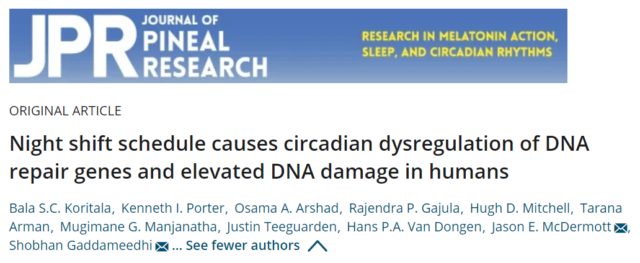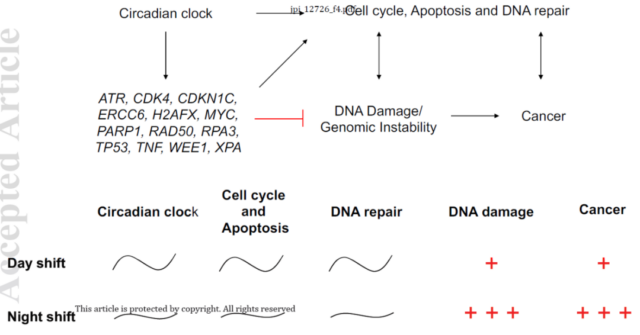Does staying up late increase the risk of cancer like night working?
- A Single US$2.15-Million Injection to Block 90% of Cancer Cell Formation
- WIV: Prevention of New Disease X and Investigation of the Origin of COVID-19
- Why Botulinum Toxin Reigns as One of the Deadliest Poisons?
- FDA Approves Pfizer’s One-Time Gene Therapy for Hemophilia B: $3.5 Million per Dose
- Aspirin: Study Finds Greater Benefits for These Colorectal Cancer Patients
- Cancer Can Occur Without Genetic Mutations?
Night work causes cancer: staying up late disrupts the rhythm of cancer-related genes, increases DNA damage and reduces repair efficiency
Does staying up late increase the risk of cancer like night working? Increasing evidence shows that cancer is more common among night shift workers, which also prompted the World Health Organization (WHO) International Agency for Research on Cancer to classify night shift work as “may be carcinogenic to humans” in 2019.
But why night shift work increases the risk of cancer is still unclear.
In addition, the phenomenon of contemporary young people staying up late is becoming more and more serious, because active or passive staying up late has become the new normal for many people because of working overtime, playing games, writing short videos, etc.
Does staying up late increase the risk of cancer like night work?
In March 2021, researchers from Washington State University States published a research paper titled: Night shift schedule causes circadian dysregulation of DNA repair genes and elevated DNA damage in humans in the Journal of Pineal Research.

The study found that night shift work disrupts the natural rhythm of cancer-related genes, delays the expression of cancer-related genes, makes night shift workers more prone to DNA damage, and reduces the efficiency of repairing these damaged DNA.
This study reveals a reason for the increased risk of cancer caused by night shift work. In addition to being used to prevent and treat night shift workers’ cancer, this research also has potential significance for current cancer treatments and can be used to optimize existing cancer treatment strategies. Treat when the effect is the best and the side effects are minimal.
Rhythm of cancer-related genes
As we all know, the human body has a so-called biological clock, which controls our circadian rhythm 24 hours a day. In fact, not only our brain has this central biological clock, each of our cells has its own dedicated biological clock. This cell clock is related to clock genes. The expression of these clock genes is rhythmic, which means that they are active. The level will change with the time of day or night.
The research team speculates that the expression of cancer-related genes may also be rhythmic, and night shift work may disrupt the rhythm of these cancer-related genes.
In order to verify this conjecture, the research team conducted a simulated shift work experiment. 14 participants spent 7 days in the sleep laboratory of Washington State University. Half of the people completed the three-day simulated night shift work in the laboratory, and the other half completed the simulated day shift work in the laboratory.
After completing the simulation shift, all participants will follow a fixed routine, which is used to study the biological rhythms generated inside humans without any external influence. As part of the experimental protocol, they stayed awake for 24 hours in a semi-lying position under constant light and room temperature, and were given the same snacks every hour. Blood samples are taken every three hours.
Analysis of white blood cells in blood samples showed that the rhythms of many cancer-related genes are different under night work conditions compared to day shifts. It is worth noting that DNA repair-related genes show obvious rhythms under day-shift working conditions, but this rhythm is lost under night-shift working conditions.
Then, the research team studied the possible consequences of changes in the rhythm of cancer-related gene expression.
The research team found that the white blood cells of night shift workers showed more DNA damage than the white blood cells of day shift workers.
In addition, the research team exposed the white blood cells extracted from the blood of these participants to radiation at two different times of the day. The results showed that the white blood cells under night shift working conditions were exposed to radiation at night, showing more DNA damage.
This means that the white blood cells of night shift workers are more susceptible to external damage such as radiation, and radiation is an important risk factor for DNA mutations and cancer.

The above findings indicate that night shift work disrupts the circadian rhythm of cancer-related genes and delays the expression of cancer-related genes, thereby reducing the repair efficiency when the body is most in need of DNA repair.
Prevention and treatment
Night shift workers often face huge health risks, ranging from increased risks of metabolic diseases, cardiovascular diseases and mental illnesses to increased risks of cancer. And they often don’t get enough attention and research from the medical profession.
The research team said that the next step will be to conduct the same study on people who work long-term night shifts and those who work during the day to determine whether unrepaired DNA damage among night shift workers will accumulate over time. This accumulation of unrepaired DNA damage will Will greatly increase the risk of cancer.
If what happens in night shift workers in real life is consistent with current research, it indicates that we need to formulate corresponding preventive strategies or develop drugs to solve the weak links in their DNA repair process.
In addition, this research is also of potential significance for current cancer treatments, and can be used to optimize existing cancer treatment strategies to treat when the effect is the best and the side effects are minimal.
(source:internet, reference only)
Disclaimer of medicaltrend.org
Important Note: The information provided is for informational purposes only and should not be considered as medical advice.



